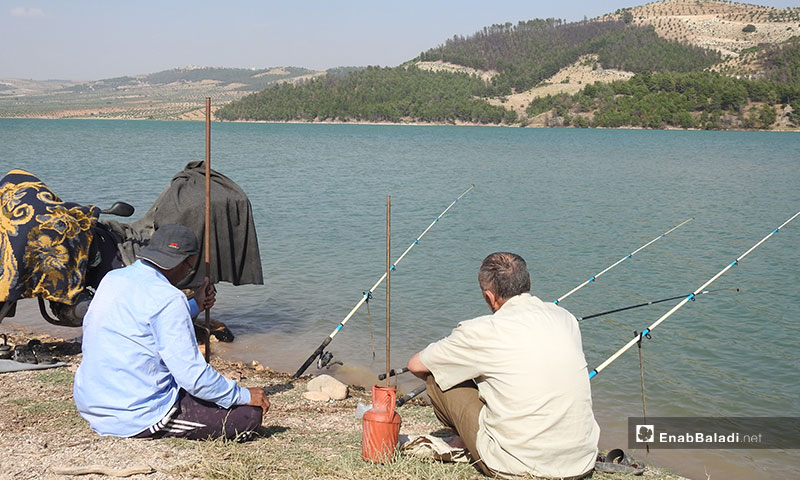



Hama countryside – Iyad Abdel Jawad.
From Hama countryside to Afrin, dozens of fishers moved their professions with them after leaving the Ghab Plain, which had been under the Syrian regime’s military attacks at the end of 2019.
Khaled al-Saleh is a fisherman, who practiced fishing in Maydanki Lake in the countryside of Afrin instead of the Orontes River, which was a source of income for him and his family after he lost hope finding other job opportunities.
Al-Saleh used to catch several different species of fish from the Orontes River, including “Carp,” “Catfish,” and “Mullets.” However, when the Syrian regime made advancement through military operations in the Ghab Plain, al-Saleh was forced to flee the violence in his village towards the vicinity of Afrin, Owning to the adverse displacement conditions, and lack of job opportunities in the area of his displacement, he resorted to fishing again in Maydanki lake.
Al-Saleh and other fishermen suffer from lack of fisheries yield in Afrin, compared to the one in the Ghab Plain, even though most of the fish that were in the “Orontes” river is available in “Maydanki Lake,” he says.
The price of Carp fish is 2,000 Syrian pounds (SYP-0.79 USD) per kilo, while the mullet is sold for 500 SYP (1.19 USD) per kilo. A kilo of catfish costs 1,500 SYP (0.59 USD), according to al-Saleh. Al-Saleh uses a cast net for fishing, and he sells most of his catch in the villages near his place of residence.
The former head of the local council in the village of Qabr Fiddah in Hama countryside, Abdul Moeen al-Masri, who is currently displaced in Afrin countryside, told Enab Baladi that fishing was widespread in the western and eastern channels of the “Orontes” River, adding that fishing was carried out through using nets or electricity to stun the fish (Electrofishing). When the channels of the “Orontes” river dries up, the fishing process also increases due to the presence of easy access to fish.
Al-Masri indicated that the Syrian regime forces’ control of Qalaat al-Madiq city and the surrounding villages made dozens of families lose their source of income; fishing and fishing farming. It is very dangerous to fish currently in the opposition’s remaining part of Orontes River, due to its proximity to the areas of contact with the regime forces.
Regarding the difficulties faced by fishermen in the countryside of Afrin, Mahmoud al-Ghabi, a displaced person, a fisherman from the Ghab Plain, said that the most prominent is dividing the Maydanki dam region into spheres of influence as each military faction has its own sphere. Besides, fishers sometimes have to obtain official authorization for fishing in a specific area, according to Mahmoud al-Ghabi.
In addition to security problems, fishers suffer from financial ones. Some fish could do the most damage to the fishing nets by tearing them apart, forcing fishers to buy new nets at high prices due to their limited availability.
The second strategy used by al-Ghabi for fish capture is the use of electric current, which increases fishing expenses due to a large amount of consumed fuel and breakdowns of the generator.
Maydanki artificial lake was established in 2000, behind “the Seventeenth of April Dam,” and is approximately two kilometers (1.2 miles) from the village of Maydanki and 15 kilometers (9.3 miles), northeast of the city of Afrin. It is a relatively small lake at only 15 Kilometers (9.3 miles) long. The total volume of the lake is nearly 190 million cubic meters, and it is surrounded by forests of pine, cypress, and olive.
Hammouda Ibrahim, a resident of the village of Aboudan, located near the “Maydanki Dam,” told Enab Baladi that the fishing profession was common in the area before “the Syrian National Army” factions took control of the city of Afrin and its countryside in March 2018; however, most of the fishermen left for the areas under the power of the “Syrian Democratic Forces” (SDF).
It is worth mentioning that fishers were catching fish to feed their families, not to sell them. Those who depended on the fishing profession as a source of income were very few.
Maydanki Lake used to be a popular domestic recreational spot, often visited by the residents of the area for picnics and swimming, then, it became a source of income for many displaced people who are looking badly for a profession to provide for their families.
if you think the article contain wrong information or you have additional details Send Correction